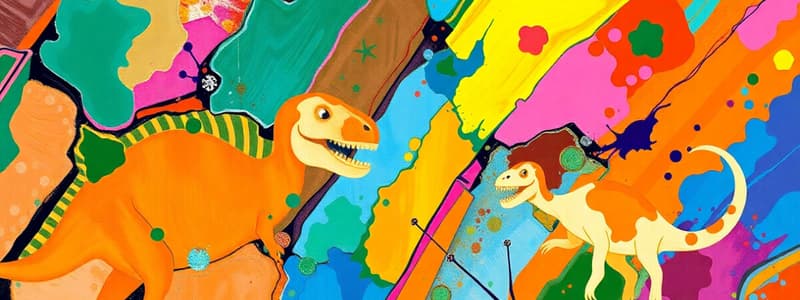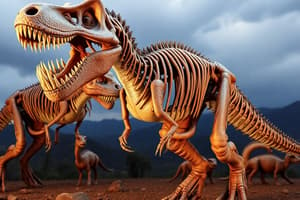Podcast
Questions and Answers
What is paleontology?
What is paleontology?
The study of fossils and ancient life forms.
Which grades does the Paleontology unit cater to for older children?
Which grades does the Paleontology unit cater to for older children?
- Grades 4-6
- Grades 7-8 (correct)
- Grades 9-12
- Grades 1-3
The Paleontology unit can be used for families with various belief systems.
The Paleontology unit can be used for families with various belief systems.
True (A)
What activities are included in The Good and the Beautiful science units?
What activities are included in The Good and the Beautiful science units?
Where can vocabulary words for the science wall be attached?
Where can vocabulary words for the science wall be attached?
Parents can choose to skip content not relevant to their children's grade level.
Parents can choose to skip content not relevant to their children's grade level.
How does The Good and the Beautiful keep its science units updated?
How does The Good and the Beautiful keep its science units updated?
What colors are present in the largest bubble?
What colors are present in the largest bubble?
Where is the second bubble positioned?
Where is the second bubble positioned?
How does the third bubble's coloring compare to the top bubble?
How does the third bubble's coloring compare to the top bubble?
The largest bubble is colored in a single color.
The largest bubble is colored in a single color.
The second bubble is ______ than the first bubble.
The second bubble is ______ than the first bubble.
Flashcards are hidden until you start studying
Study Notes
Overview of Paleontology Unit
- This unit encompasses a structured approach to learning about paleontology for grades 3-8.
- Specific lesson extensions are available for older students (grades 7-8) and can be skipped for younger audiences (grades 3-6).
- Emphasizes hands-on activities and experiments under adult supervision for safety.
Unit Content and Structure
- Contains 11 lessons, covering topics such as fossils, dinosaurs, carnivores and herbivores, and introductory archaeology.
- Lessons detail various aspects of paleontology, including the discovery of fossils and the excavation process.
- Includes sections on unique fossil preservation such as in ice and tar.
Educational Materials
- A student journal is necessary for all students, with guided activities tailored to each lesson.
- Vocabulary words are included for a dedicated science wall or tri-fold presentation board to enhance learning.
- Supplementary videos enhance the learning experience; access provided through a designated website or app.
Belief Framework
- Unit is designed to align with basic Bible principles, accommodating a range of beliefs regarding the age of the earth, such as Young Earth or Old Earth perspectives.
- Encourages families to adapt lessons to fit their personal beliefs without compromising educational content.
Lesson Preparation and Updates
- Each lesson starts with straightforward preparation instructions to facilitate teaching.
- Regular updates to the course materials ensure the most current scientific discoveries are included, thereby enhancing the educational value of the unit.
- Emphasizes the importance of real-world applications of learning through activities and discussions.
Soap Bubbles Description
- Three pixelated soap bubbles depicted against a dark background, creating a vivid contrast.
- The largest bubble is at the top, featuring a color palette of blue, pink, and white.
- The second bubble is smaller and located on the bottom left side, suggesting a spatial arrangement.
- The third bubble, positioned on the bottom right, shares the same vibrant coloring as the top bubble, enhancing visual uniformity.
Studying That Suits You
Use AI to generate personalized quizzes and flashcards to suit your learning preferences.




